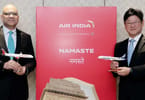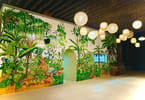Abu Dhabi has been dubbed as a tourism destination that ranks among the world’s “best-in-class” by some of the world’s most influential travel and tourism industry players following its hosting of the 2013 Global Tourism Summit by the World Travel & Tourism Council recently. Hosting the event is a clear manifestation that Abu Dhabi is committed to making its case to be considered a major travel and tourism destination, but is it ready for the world?
“Everyone is welcome to Abu Dhabi,” Abu Dhabi Tourism & Culture Authority (ADTCA) Director of Tourism Ecosystems Sultan Hamad Al Mutawa Al Dhaheri. In a lot of ways, Abu Dhabi has been lenient towards tourists. It is a known fact that alcohol consumption, while it is forbidden for locals, is allowed in tourist establishments such as hotel bars, restaurants, and nightclubs, which some are even open until 4:00 am.
All of these perks given to tourists have a limit, and while the ADTCA Director of Tourism Ecosystems stands firm in his disposition that “everyone is welcome to Abu Dhabi,” the destination is clearly not for everyone. It is a destination, however, that is more for those traveling for business rather than leisure and has the infrastructure and tourism products that attract the luxury market over the budget-type tourist. Within that shuffle of niche markets, Abu Dhabi is undoubtedly a prime wedding destination with its picturesque sceneries and architectural wonders. Major hotels like Westin even offer wedding packages to its guests.
More weddings mean more jobs. As a matter of fact, Cake, a bakery in Chester, England, made history on March 3, 2013 when it created what is touted as the world’s most expensive wedding cake, valued at £34 million (US$52.7 million). Guess who the cake was for? The eight-tiered confection was decorated with more than 4,000 diamonds and created for the National Gay Wedding Show, which, according to UK’s Event Magazine, attracted more than 200 exhibitors offering services, advice, and support for same-sex couples who want to tie the knot.
The global travel and tourism industry is rightfully taking notice. Various media outlets have in the last few years even compiled their own “Top Ten Gay Wedding Destinations.” A few clicks on Google.com will show you that gay weddings mean big business. And, given the current debate on gay marriage and the momentum of it being allowed by lawmakers around the world begs the question: If a same-sex couple wanted to get married in Abu Dhabi, would Abu Dhabi be hospitable to their request?
“We are not the right authority to allow or not allow, we are a tourism board. Our mandate is to promote our destination,” said the ADTCA Director of Tourism Ecosystems. “And we welcome travelers.”
“All travelers are welcome to as long as they respect and preserve the customs and traditions of the Emirate,” ADTCA Senior Marketing Communication Executive Sam Dulka added.
Would the Secretary-General of the UN World Tourism Organization, Taleb Rifai, allow such a wedding to take place if it were up to him? He said: “Well, first of all, it is not up for me to decide. It’s neither realistic nor correct nor will it ever happen. Every country has its own laws and regulations and its own inertia of developing. The world is changing, but changes in this world take time like anything else in life. We need to respect human rights of people, and we equally have to respect the pace upon which societies change.”
Asked whether tourism clashes with Islamic beliefs, Sultan said: “Tourism is about hospitality, and hospitality is at the very core of our culture. It is here that hospitality was required by [our] sheer way of life and tradition. A traveler, no matter who or where [they are] from, [is] obliged to be given food and shelter for a minimum of three days before he continues his journey. The adventurer Wilfred Thesiger, who we recall with fondness as Mubarak Bin London, recorded how in his crossings of our Liwa desert his unsuspecting hosts would often go without sustenance, to ensure he slept and ate well and gathered his strength for his trials ahead. This region then is rich with hospitality history. It is part of a past we are proud of and we believe integral to the bright future that brings us all here.”
Sultan gets the chance to elaborate on what this all means in my next article, which will be presented in a Q&A format. Stay tuned!






















